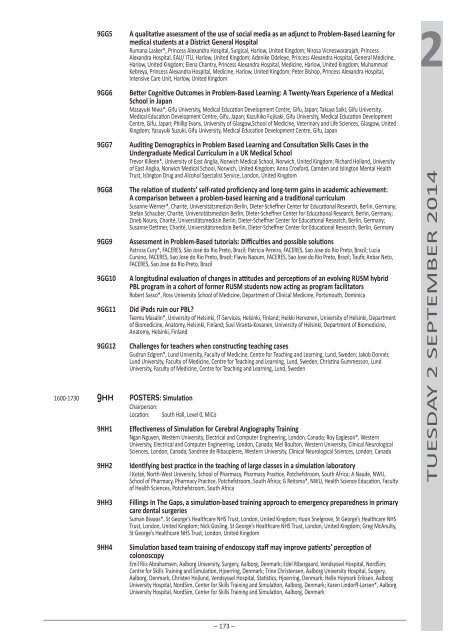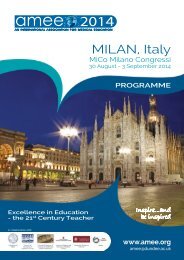Ac1xd
Ac1xd
Ac1xd
You also want an ePaper? Increase the reach of your titles
YUMPU automatically turns print PDFs into web optimized ePapers that Google loves.
2TUESDAY 2 SEPTEMBER 20149GG59GG69GG79GG89GG99GG109GG119GG12A qualitative assessment of the use of social media as an adjunct to Problem-Based Learning formedical students at a District General HospitalRumana Lasker*, Princess Alexandra Hospital, Surgical, Harlow, United Kingdom; Nirosa Vicneswararajah, PrincessAlexandra Hospital, EAU/ ITU, Harlow, United Kingdom; Adenike Odeleye, Princess Alexandra Hospital, General Medicine,Harlow, United Kingdom; Elena Chantry, Princess Alexandra Hospital, Medicine, Harlow, United Kingdom; MuhammadKebreya, Princess Alexandra Hospital, Medicine, Harlow, United Kingdom; Peter Bishop, Princess Alexandra Hospital,Intensive Care Unit, Harlow, United KingdomBetter Cognitive Outcomes in Problem-Based Learning: A Twenty-Years Experience of a MedicalSchool in JapanMasayuki Niwa*, Gifu University, Medical Education Development Centre, Gifu, Japan; Takuya Saiki, Gifu University,Medical Education Development Centre, Gifu, Japan; Kazuhiko Fujisaki, Gifu University, Medical Education DevelopmentCentre, Gifu, Japan; Phillip Evans, University of Glasgow,School of Medicine, Veterinary and Life Sciences, Glasgow, UnitedKingdom; Yasuyuki Suzuki, Gifu University, Medical Education Development Centre, Gifu, JapanAuditing Demographics in Problem Based Learning and Consultation Skills Cases in theUndergraduate Medical Curriculum in a UK Medical SchoolTrevor Killeen*, University of East Anglia, Norwich Medical School, Norwich, United Kingdom; Richard Holland, Universityof East Anglia, Norwich Medical School, Norwich, United Kingdom; Anna Croxford, Camden and Islington Mental HealthTrust, Islington Drug and Alcohol Specialist Service, London, United KingdomThe relation of students’ self-rated proficiency and long-term gains in academic achievement:A comparison between a problem-based learning and a traditional curriculumSusanne Werner*, Charité, Universitätsmedizin Berlin, Dieter-Scheffner Center for Educational Research, Berlin, Germany;Stefan Schauber, Charité, Universitätsmedizin Berlin, Dieter-Scheffner Center for Educational Research, Berlin, Germany;Zineb Nouns, Charité, Universitätsmedizin Berlin, Dieter-Scheffner Center for Educational Research, Berlin, Germany;Susanne Dettmer, Charité, Universitätsmedizin Berlin, Dieter-Scheffner Center for Educational Research, Berlin, GermanyAssessment in Problem-Based tutorials: Difficulties and possible solutionsPatricia Cury*, FACERES, São José do Rio Preto, Brazil; Patricia Pereira, FACERES, Sao Jose do Rio Preto, Brazil; LuciaCursino, FACERES, Sao Jose do Rio Preto, Brazil; Flavio Naoum, FACERES, Sao Jose do Rio Preto, Brazil; Toufic Anbar Neto,FACERES, Sao Jose do Rio Preto, BrazilA longitudinal evaluation of changes in attitudes and perceptions of an evolving RUSM hybridPBL program in a cohort of former RUSM students now acting as program facilitatorsRobert Sasso*, Ross University School of Medicine, Department of Clinical Medicine, Portsmouth, DominicaDid iPads ruin our PBL?Teemu Masalin*, University of Helsinki, IT-Services, Helsinki, Finland; Heikki Hervonen, University of Helsinki, Departmentof Biomedicine, Anatomy, Helsinki, Finland; Suvi Viranta-Kovanen, University of Helsinki, Department of Biomedicine,Anatomy, Helsinki, FinlandChallenges for teachers when constructing teaching casesGudrun Edgren*, Lund University, Faculty of Medicine, Centre for Teaching and Learning, Lund, Sweden; Jakob Donnér,Lund University, Faculty of Medicine, Centre for Teaching and Learning, Lund, Sweden; Christina Gummesson, LundUniversity, Faculty of Medicine, Centre for Teaching and Learning, Lund, Sweden1600-1730 9HH POSTERS: SimulationChairperson:Location: South Hall, Level 0, MiCo9HH19HH29HH39HH4Effectiveness of Simulation for Cerebral Angiography TrainingNgan Nguyen, Western University, Electrical and Computer Engineering, London, Canada; Roy Eagleson*, WesternUniversity, Electrical and Computer Engineering, London, Canada; Mel Boulton, Western University, Clinical NeurologicalSciences, London, Canada; Sandrine de Ribaupierre, Western University, Clinical Neurological Sciences, London, CanadaIdentifying best practice in the teaching of large classes in a simulation laboratoryI Kotzé, North-West University, School of Pharmacy, Pharmacy Practice, Potchefstroom, South Africa; A Naude, NWU,School of Pharmacy, Pharmacy Practice, Potchefstroom, South Africa; G Reitsma*, NWU, Health Science Education, Facultyof Health Sciences, Potchefstroom, South AfricaFillings In The Gaps, a simulation-based training approach to emergency preparedness in primarycare dental surgeriesSuman Biswas*, St George’s Healthcare NHS Trust, London, United Kingdom; Huon Snelgrove, St George’s Healthcare NHSTrust, London, United Kingdom; Nick Gosling, St George’s Healthcare NHS Trust, London, United Kingdom; Greg McAnulty,St George’s Healthcare NHS Trust, London, United KingdomSimulation based team training of endoscopy staff may improve patients’ perception ofcolonoscopyEmil Riis Abrahamsen, Aalborg University, Surgery, Aalborg, Denmark; Edel Ribergaard, Vendsyssel Hospital, NordSim,Centre for Skills Training and Simulation, Hjoerring, Denmark; Trine Christensen, Aalborg University Hospital, Surgery,Aalborg, Denmark, Christen Hojlund, Vendsyssel Hospital, Statistics, Hjoerring, Denmark; Helle Hojmark Eriksen, AalborgUniversity Hospital, NordSim, Center for Skills Training and Simulation, Aalborg, Denmark; Karen Lindorff-Larsen*, AalborgUniversity Hospital, NordSim, Center for Skills Training and Simulation, Aalborg, Denmark– 173 –



